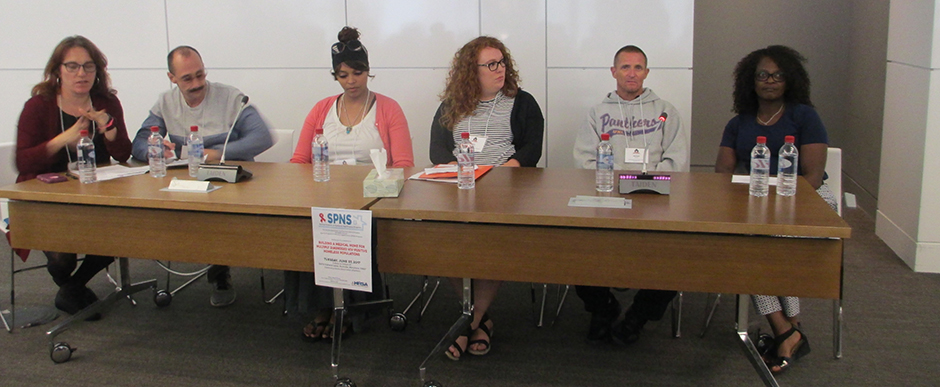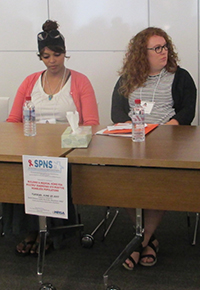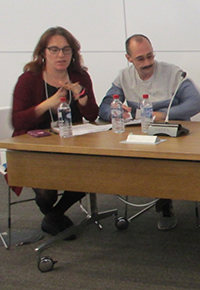Monday, July 31, 2017
Panel of three client-navigator teams describe the working relationships that led to stable housing, better quality of life
At a June 27 meeting at the Health Resources & Services Administration (HRSA), staff from HRSA, Housing and Urban Development (HUD), and Substance Abuse and Mental Health Services Administration (SAMHSA) learned of the results of a five-year initiative focused on helping people living with HIV who were experiencing homelessness and were diagnosed with mental health and substance use disorders receive care, treatment and services. The results were impressive. More than 1,300 people were served, and of the 909 individuals enrolled in a multisite study, 84% were linked to HIV primary care within 90 days, and 71% achieved viral suppression. Behind those collective results, though, are a multitude of stories–stories of individuals drawing on their last ounce of courage to turn their lives around, of medical teams working together with compassion, persistence, and ingenuity to find whatever is needed for that one person to get to the next step in reclaiming their lives. Attendees had the opportunity to hear some of those stories in a panel discussion of three clients and the providers who worked with them. 
Michael and Amelia
 His lowest point occurred when someone gave him rat poison one night, recounted Michael Delaney from San Diego. Living on the street and with eight drug rehabilitation programs behind him, he had resigned himself to his fate, saying “If I die an addict, I die an addict.” But lying on the street suffering from cyanide poisoning, calling 911 unsuccessfully, and not being able to reach a hospital was the worst experience of his life. When he survived that episode and was introduced to Amelia, Michael was ready for a change.
His lowest point occurred when someone gave him rat poison one night, recounted Michael Delaney from San Diego. Living on the street and with eight drug rehabilitation programs behind him, he had resigned himself to his fate, saying “If I die an addict, I die an addict.” But lying on the street suffering from cyanide poisoning, calling 911 unsuccessfully, and not being able to reach a hospital was the worst experience of his life. When he survived that episode and was introduced to Amelia, Michael was ready for a change.
“I like to use the analogy of the ice-picker ship,” explained Amelia Broadnax, a care navigator at People Assisting the Homeless. “My job is to pick the ice so that he can navigate through it. And lo and behold—Michael became a damn good captain!” With Amelia coordinating a team effort to support him, Michael was able to find emergency housing, reconnect to medical care, mental health and substance use treatment services and, when he was ready, permanent housing. He has remained substance free and housed for two years now. “It’s a weird feeling, but I can say I don’t have any stress in my life now,” said Michael. “When I need help or direction, I don’t have too far to go. Family members I haven’t seen in 25 years are accepting me back.” Now Michael seeks out others to encourage them to connect to the services they need. “People say the worst thing you can do is to go to your old stomping grounds. But I put myself out there. To do that, I keep that rat poison night in my mind. Hep C: cured. Undetectable HIV—I’m healthy! I can’t lose that. Not an option.”
Myranda and Jamie
 “When I met Jamie, I can’t say I was ready for the change that she helped me with,” recalled Myranda Harris from Portland, OR. “I had been a heroin addict for 15 years. I was in a violent relationship. I was very violent, very angry. I was drinking up to a fifth a day. I was difficult to work with—I didn’t show up, and when I did, I was drunk. I expected her to run. But she was willing to help me.” Jamie Christianson is a patient navigator at Multnomah County HIV Health Services Center. When Myranda had to go to the hospital and then to jail for assault, Jamie was with her through that dark time. Jamie helped her get into an inpatient program for individuals who were dually diagnosed with mental health and substance use disorders. But the day before Myranda was scheduled to start, the mental health counselor quit. “For Myranda to agree to go to that program, to open the lid on the trauma she’s endured, was really scary,” Jamie recalled. “I started calling everyone in the Oregon alcohol and substance use provider directory, and Myranda had to do more waiting. This was a crisis that would have derailed anyone, including myself. Yet she got through it.” Today Myranda lives in a “nice little quaint one-bedroom” with her pet chinchilla. She is on the advisory board at Multnomah County HIV Health Services Center, and she attends AA and NA meetings and is a sponsor. “The entire staff, from front desk to everyone beyond, have been a blessing,” she said. “So many things in my life have been restored—my mind, my emotions, the relationship with my daughter. I’m really grateful.”
“When I met Jamie, I can’t say I was ready for the change that she helped me with,” recalled Myranda Harris from Portland, OR. “I had been a heroin addict for 15 years. I was in a violent relationship. I was very violent, very angry. I was drinking up to a fifth a day. I was difficult to work with—I didn’t show up, and when I did, I was drunk. I expected her to run. But she was willing to help me.” Jamie Christianson is a patient navigator at Multnomah County HIV Health Services Center. When Myranda had to go to the hospital and then to jail for assault, Jamie was with her through that dark time. Jamie helped her get into an inpatient program for individuals who were dually diagnosed with mental health and substance use disorders. But the day before Myranda was scheduled to start, the mental health counselor quit. “For Myranda to agree to go to that program, to open the lid on the trauma she’s endured, was really scary,” Jamie recalled. “I started calling everyone in the Oregon alcohol and substance use provider directory, and Myranda had to do more waiting. This was a crisis that would have derailed anyone, including myself. Yet she got through it.” Today Myranda lives in a “nice little quaint one-bedroom” with her pet chinchilla. She is on the advisory board at Multnomah County HIV Health Services Center, and she attends AA and NA meetings and is a sponsor. “The entire staff, from front desk to everyone beyond, have been a blessing,” she said. “So many things in my life have been restored—my mind, my emotions, the relationship with my daughter. I’m really grateful.”
Scott and Deb
 “People have to understand: I’ve got a lot of trauma with doctors, it’s hard for me to go into a clinic where it’s four walls,” explained Scott Carlisle from San Francisco. “I’ve been on the street all my life, in and out of prison, shooting heroin, smoking crack, not taking care of myself. Finally one day I went to the hospital. I was sick and ran into Deb.”
“People have to understand: I’ve got a lot of trauma with doctors, it’s hard for me to go into a clinic where it’s four walls,” explained Scott Carlisle from San Francisco. “I’ve been on the street all my life, in and out of prison, shooting heroin, smoking crack, not taking care of myself. Finally one day I went to the hospital. I was sick and ran into Deb.”
The encounter was no accident—Deb Borne, a doctor at San Francisco Department of Public Health (SFDPH), had been looking for an opportunity to engage Scott for a year and a half. “Her compassion and kindness made me comfortable,” Scott recalled. “I’ve never seen a doctor come to you—anywhere I’m at, she’ll come. They put me in emergency housing, then finally I got into forensic [transitional supportive] housing.” “The housing and the medical care go hand in hand. Coming in from the street, the silence was loud. I could finally close both eyes, didn’t have to sleep with a pistol. It made a difference, just knowing somebody was there. If it wasn’t for the agency, Deb, Talia [Talia Roven, a navigator with partner program Shanti, who took over Scott’s care when he transitioned from intensive services], and the entire team, I wouldn’t be here.” Scott is enrolled in the peer specialist mental health certificate advanced course at Richmond Area Multi-Services, Inc. “I‘m in a college class to get certified so I can give back to the community,” he explained. “I’m able to volunteer. At API [Asian & Pacific Islander Wellness Center], I work as a peer navigator, escorting clients to the hospitals. I run a program that takes people to baseball games, museums—I took 15 people to Alcatraz the other day. I won’t turn back. I’m not going to give up.” Deb too has benefited from working with Scott. “I’m the principal investigator for the project, and when I met Scott and other people, I fell in love with the work,” she said. “I’ve learned more from the consumers and case managers that I’ve worked with than I ever learned in medical school. Part of what Scott taught me is to help other providers be the kinds of clinicians that can serve this population.” To learn more about the initiative Building a Medical Home for Multiply Diagnosed HIV-Positive Homeless Populations, visit https://ciswh.org/project/medheart